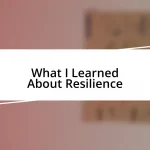Key takeaways:
- Support groups provide a comforting community and encourage sharing, which can validate personal struggles and foster healing.
- Identifying specific needs for support is crucial; recognizing challenges can guide individuals to the appropriate support groups.
- Researching options and evaluating group dynamics are essential for finding a compatible and supportive environment.
- Active engagement and sharing experiences within the group enhance connections and contribute to personal growth and healing.
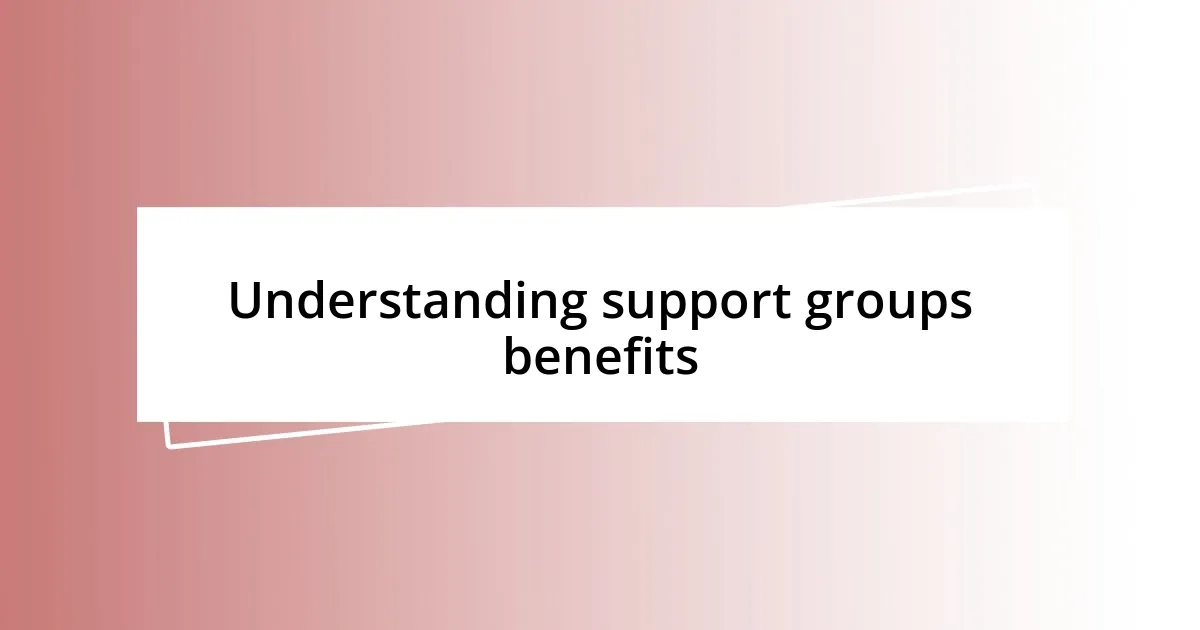
Understanding support groups benefits
Support groups offer a sense of community that can be incredibly comforting, especially when facing personal challenges. I remember walking into my first meeting, feeling like an outsider, but the warmth of shared experiences quickly eased my anxiety. Don’t you think there’s something healing about simply knowing you’re not alone in your struggles?
One of the most profound benefits I’ve found is the encouragement to share and allow vulnerability. Listening to others tell their stories opened up a new world for me; it helped me reflect on my own journey. Have you ever experienced that moment of realization when someone else’s words resonate deeply with you? It’s as if they’ve voiced what you’ve been silently grappling with.
Moreover, support groups can provide invaluable resources and coping strategies. It’s not just about sharing feelings—many members bring practical advice and suggestions from their own lives that can spark new ideas for handling tough situations. I once found out about a helpful book from a fellow participant, and that recommendation changed my perspective entirely. Isn’t it amazing how one conversation can lead to significant personal growth?
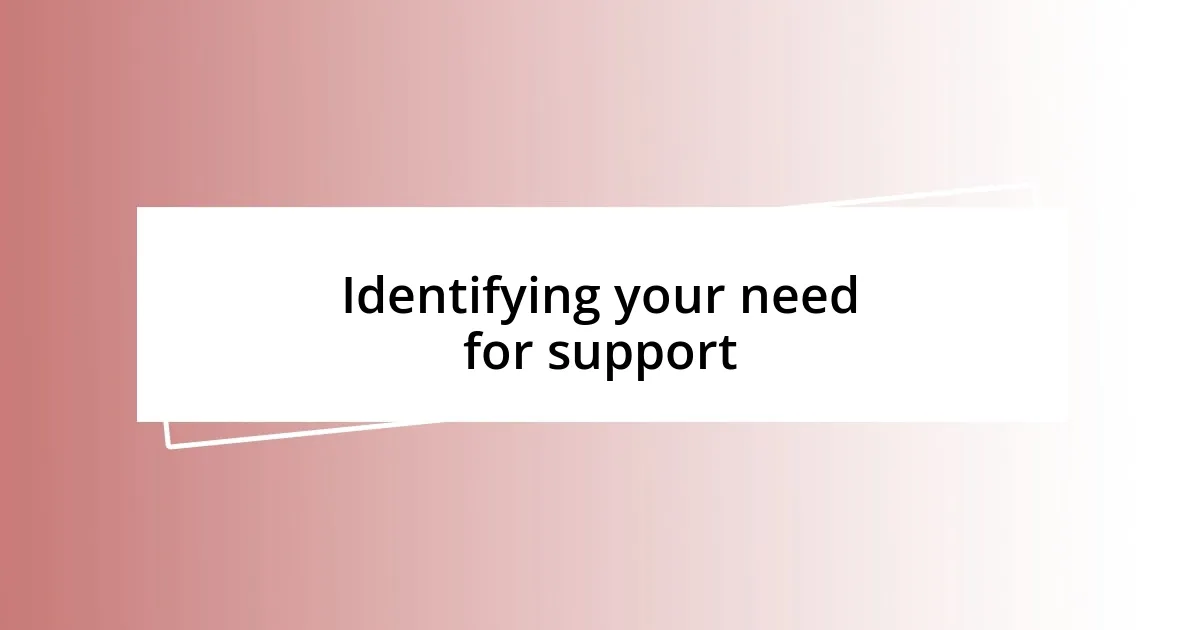
Identifying your need for support
Recognizing the need for support can often feel daunting, but it’s an essential step in the healing journey. I remember a time when I felt overwhelmed by my emotions, struggling with the weight of my thoughts. It dawned on me that my isolation was compounding my struggles—seeking support became a lifeline I desperately needed. Have you ever noticed how silence can amplify feelings of loneliness? Acknowledging that I wasn’t coping well was the first courageous step I took.
As I continued to reflect on my circumstances, I realized that identifying specific aspects of my life where I needed help could guide me to the right support group. I once made a list of my challenges, from anxiety to relationship struggles. This small but significant act brought clarity, illustrating that seeking help is not a sign of weakness, but rather an acknowledgment of our shared human experience. Have you tried journaling your feelings to pinpoint your needs? It can be a transformative exercise.
In my journey, I’ve learned that sometimes it’s the accumulation of small stresses that indicate a greater need for support. I’ll never forget the moment I overheard someone in a support meeting mention how their stress at work had affected their relationships at home. It resonated so deeply with me; I realized I was in a similar boat. This revelation underscored the importance of recognizing any disconnect in our lives—being honest about these feelings can be incredibly empowering.
| Signs You Might Need Support | Your Interpretation |
|---|---|
| Feeling overwhelmed by emotions | Recognizing isolation in your struggles |
| Experiencing recurring stress | Pinpointing stressors in daily life |
| Difficulty managing relationships | Understanding how external stresses impact connections |
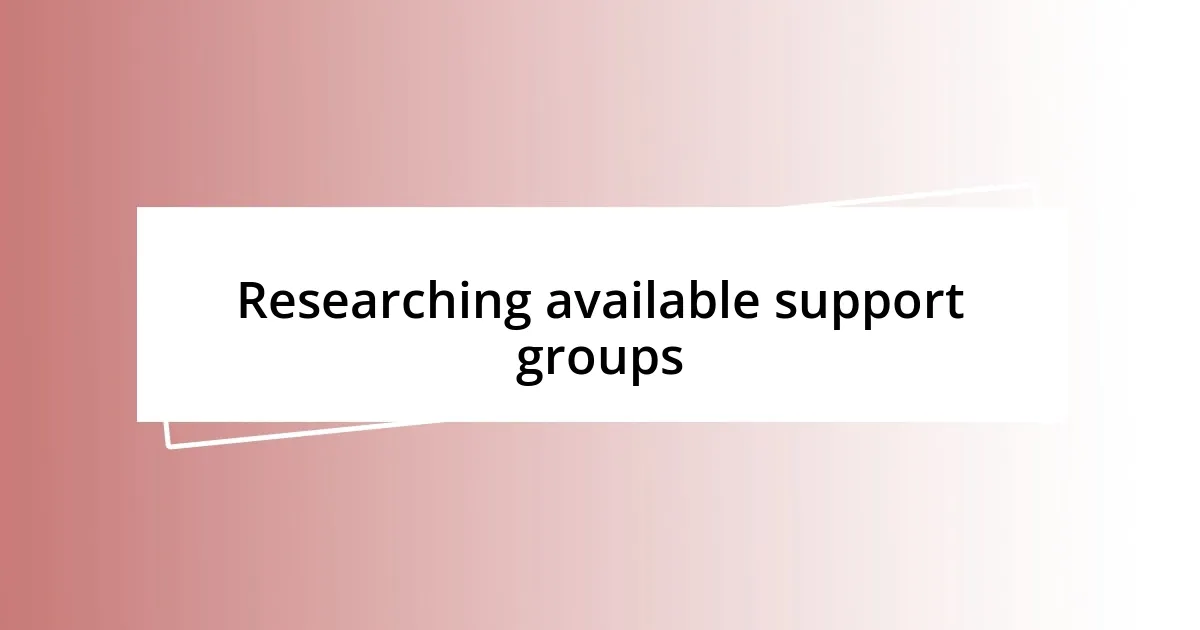
Researching available support groups
Diving into research for support groups can feel a bit overwhelming at first, but it doesn’t have to be. I recall spending hours online, looking for something that resonated with my experiences. It was almost like searching for a needle in a haystack. However, I found that taking the time to explore various options opened up new possibilities. Even a simple Google search can lead you to local and online groups that align with your specific needs. Here are some practical steps I found helpful during my own research:
- Search online: Websites like Meetup or Facebook often host listings of community groups.
- Check local organizations: Many non-profits or community centers can provide information on support groups.
- Reach out to professionals: Therapists or counselors often have insights into available local resources.
- Explore forums or blogs: Personal stories can guide you toward genuine groups that have positively impacted others.
As I scoured through various options, I quickly learned that not all support groups are created equal. Some focus on specific issues while others promote more general sharing. I remember trying out a couple of different groups before finding my perfect fit. Initially, I attended a few meetings where the atmosphere felt too structured for my liking. What’s meant to be a space for honesty and openness shouldn’t feel like a lecture, right? Eventually, I stumbled across a casual, laid-back group where laughter flowed as freely as sharing, and I felt like I belonged. This journey of researching support groups truly highlighted the importance of finding a community that resonates with you.

Evaluating group compatibility criteria
When evaluating compatibility with a support group, I found it essential to consider values and shared experiences. It’s interesting how a group’s ethos can set the tone for your entire experience. For instance, during my search, I joined a group that emphasized vulnerability as a strength, and it made all the difference. Have you ever felt more at ease sharing in an environment that promotes acceptance? It’s amazing what that kind of ethos can do for your mental state.
Another critical factor is the group dynamics. I remember attending a session where everyone was polite, yet the conversations felt superficial or even forced. I realized then that genuine connection isn’t just about being present; it’s about feeling safe enough to let your guard down. Have you felt that tension during introductions? Finding the right group is not merely about the issues discussed but about how members communicate with one another, creating a supportive space where all voices can be heard.
Lastly, I recommend being open to trial and error. In the beginning, I felt a lot of pressure to commit to one particular group immediately. However, after a few tries with different ones, I began to appreciate the value of finding a place where I truly felt at home. The first group I connected with was helpful but didn’t click for me emotionally. This journey taught me that compatibility is not just about what they discuss but how they make you feel. Have you found your place yet? It may take time, but it’s worth the search.
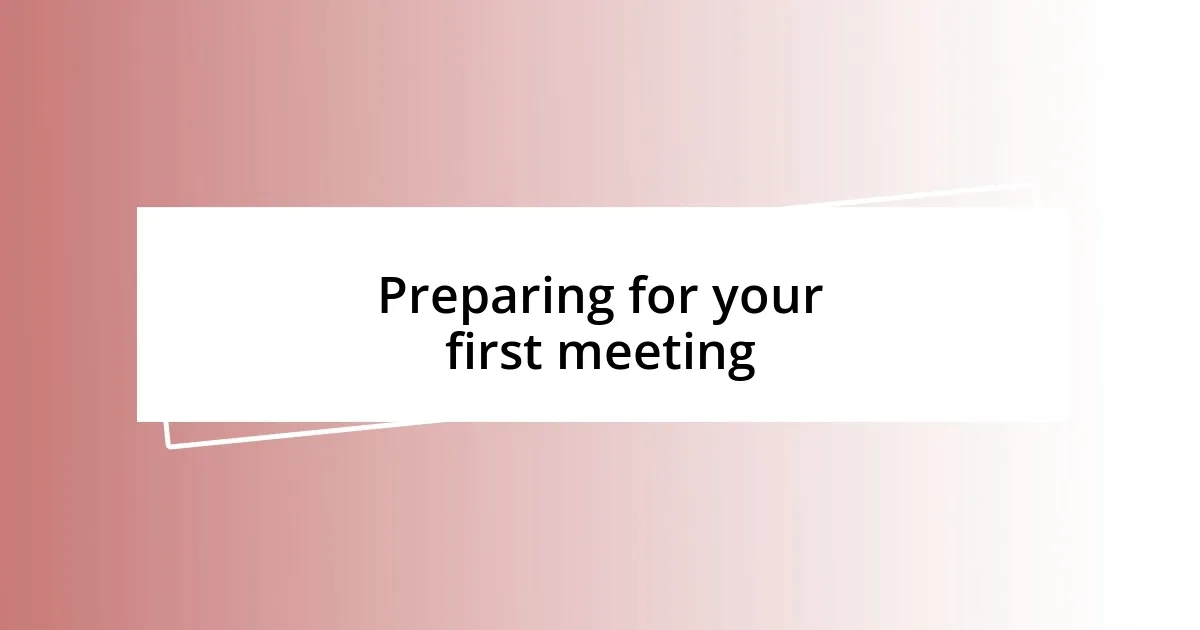
Preparing for your first meeting
Before stepping into that first support group meeting, I recommend preparing yourself mentally and emotionally. It’s natural to feel a swirl of anxiety and excitement. I recall pacing my living room, rehearsing what I wanted to say. It helped me process my feelings. Perhaps you might want to jot down some thoughts or questions beforehand to ease that nervous energy. Trust me, having a few key points in mind can make a world of difference when the moment arrives.
Additionally, I found it helpful to dress comfortably. This may seem trivial, but being at ease in what you’re wearing set the tone for my confidence. I still remember choosing an outfit that felt like a soft hug. It allowed me to focus on connecting with others instead of worrying about how I looked. Have you ever walked into a room and felt out of place? Comfortable clothing can be one less thing to worry about while you’re trying to find your footing.
Finally, consider arriving a bit early. That extra time provides a chance to soak in the atmosphere and possibly chat with others before the meeting starts. I often marvel at how small gestures can break the ice, like a friendly smile or a simple “Hello.” It’s a way of grounding yourself—a moment of connection that builds anticipation instead of dread. Have you ever noticed how that first shared laugh or nod can dispel tension? Taking these steps made my first meetings feel more welcoming and less intimidating.
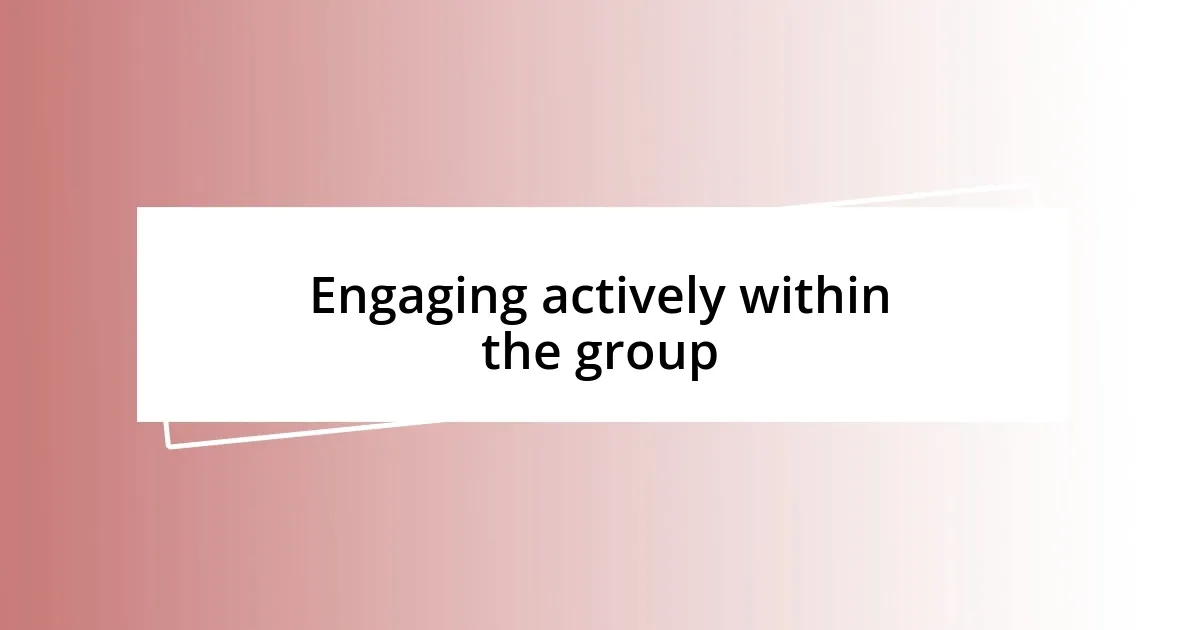
Engaging actively within the group
Engaging actively within the group is a transformative experience, one that I genuinely cherish. I recall a particular meeting where we all shared our stories with such openness that it felt like a wave of trust swept over the room. Have you ever felt that connection when sharing something personal? It’s as if the walls come down, and you realize you’re not alone. In those moments, I truly felt valued, fostering a bond among group members that was tangible.
One of the practices that really helped me engage was asking questions. After hearing someone share their struggles, I often found myself genuinely curious about their journey. I remember one instance when someone spoke about a challenge they faced, and I asked how they navigated that experience. That conversation opened doors for deeper discussions and made others feel appreciated for their contributions. Encouraging others to reflect on their stories not only enriches the dialogue but strengthens our connections as a group. Have you considered how a simple question can lead to profound insights?
Moreover, I realized that participating in group activities could enhance engagement significantly. During one session, we engaged in a creative exercise where we expressed our feelings through art. I was hesitant initially, but as I painted, I found a wellspring of emotions flowing out, which was incredibly cathartic. Have you ever discovered something new about yourself in an unexpected setting? That shared experience not only created a lively atmosphere but also fostered a sense of unity. It’s moments like these that truly highlight the value of active participation.
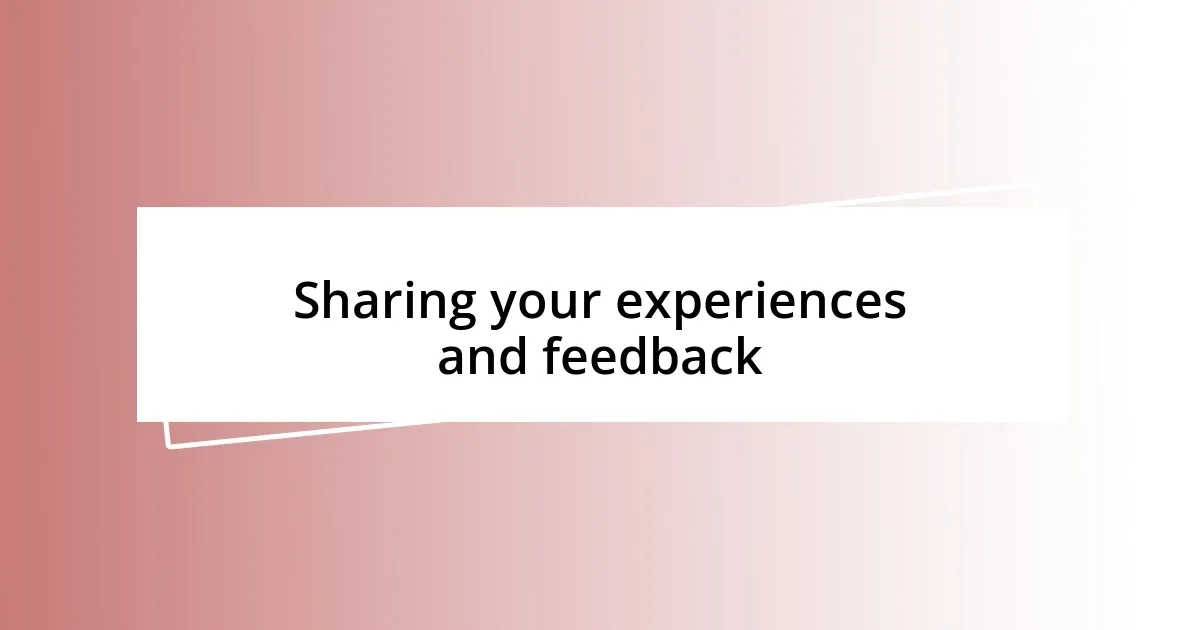
Sharing your experiences and feedback
Sharing your experiences can be one of the most powerful aspects of being in a support group. I remember sitting in my first session, and when it was finally my turn to speak, I felt a mix of trepidation and relief. Taking a deep breath, I shared a story that had been weighing heavily on my heart. The nods of understanding from my fellow group members validated my feelings in a way I hadn’t expected. Isn’t it amazing how letting others hear your struggles can lighten your emotional load?
After sharing, I started to realize the importance of feedback from others. Their insights often reflected perspectives I hadn’t considered. I vividly recall a moment when one member gently challenged my view on a situation I’d shared, prompting me to think more deeply about my own feelings and reactions. Have you ever had someone else’s words shift your perspective? That exchange taught me that feedback is not only about support but also about growth.
Additionally, I began to prioritize giving feedback to others. I remember a group member who seemed hesitant to share, and when they finally opened up, their story resonated with me deeply. I took the time to acknowledge their courage and express how their experience mirrored some of my own. The gratitude in their eyes was priceless. How often do we underestimate the impact of our words? Positive feedback fosters a sense of belonging and encouragement that can propel everyone forward in their healing journey.
